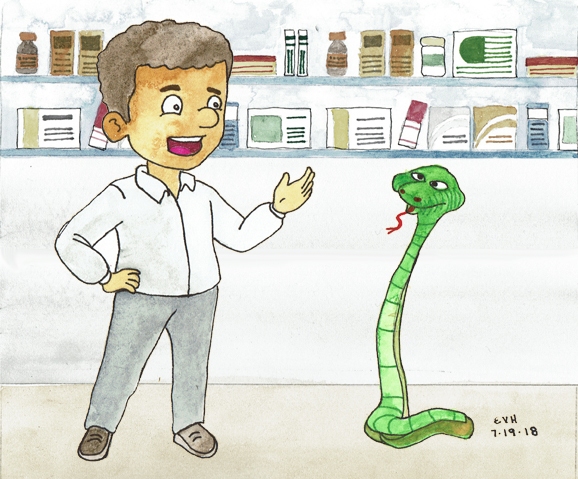
Jataka 69
Visavanta Jātaka
The Viper
as told by Eric Van Horn
originally translated by Robert Chalmers, B.A., of Oriel College, Oxford University
originally edited by Professor Edward Byles Cowell, Cambridge University
In many of these stories we are reminded that these are events that took in previous lives while the Buddha and his disciples were still working their way up the path to awakening. In this story we see what can be a commendable quality, and that is resolve. But we also see Sāriputta as a poisonous snake using his resolve to do great harm. Most people are like that. We have a combination of qualities. Some of these qualities can be either useful or harmful. The object is to use these qualities in a beneficial way, then to also cultivate good qualities like compassion and wisdom and to abandon our unwholesome qualities.
“May shame.” This story was told by the Master while at Jetavana. It is about Sāriputta, the Commander of the Dharma. Tradition says that there was a time when the Elder used to eat a certain kind of cakes. As a result, people came to the monastery with many of them for the Saṇgha. After the monks had all eaten their fill, there were still many left over. The givers of the cakes said, “Sirs, take some for the monks who are away in the village.”
Just then a youth, who was the Elder’s co-resident, was away in the village. They saved a portion for him. But when he did not return, and they felt that it was getting very late (monastics are not allowed to eat after noon or to store food for the next day), this portion was given to the Elder. When Sāriputta ate this portion, the youth finally arrived. Accordingly, the Elder explained what had happened to him, saying, “Sir, I have eaten the cakes that were set aside for you.”
“Ah!” was the rejoinder, “we all have a sweet tooth.” The Great Elder was very troubled by this.
“From this day forward,” Sāriputta exclaimed, “I vow never to eat these cakes again.” And from that day forward, so tradition says, the Elder Sāriputta never touched those cakes again! This abstention became a matter of common knowledge in the Saṇgha, and the monks talked about it in the Dharma Hall. The Master said, “What are you talking about, brothers, as you sit here?” When they told him, he said, “Brothers, when Sāriputta gives something up, he never goes back to it again, even if his life is at stake." And so saying, he told this story of the past.
Once upon a time, when Brahmadatta was reigning in Benares, the Bodhisatta was born into a family of doctors skilled in curing snake bites. And when he grew up, he practiced this for a livelihood.
One day someone was bitten by a snake, and his relatives quickly fetched the doctor. The Bodhisatta said, “Shall I extract the venom with the usual antidotes, or should we catch the snake and make it suck its own poison out of the wound?”
“Have the snake caught and make it suck the poison out,” they said. So, he had the snake caught. He asked the creature, “Did you bite this man?”

Figure: The Physician and the Stubborn Snake
“Yes, I did,” was the answer.
“Well then, suck your own poison out of the wound.”
“What? Take back the poison I have once shed!” the snake cried. “I have never done this, and I never will.”
Then the doctor made a fire with wood, and he said to the snake, “Either you suck the poison out or into the fire you go.”
“Even though I will be doomed by the flames, I will not take back the poison I shed,” the snake said, and he repeated the following stanza:
May shame be on the poison which, once shed,
To save my life, I swallow down again!
More welcome death than life bought with weakness!
With these words, the snake moved towards the fire! But the doctor barred its way and drew out the poison with medicines and charms so that the man was well again. Then he taught the Precepts to the snake and set it free, saying, “From here on, do not harm anyone.”
And the Master went on to say, “Brothers, when Sāriputta has once parted with anything, he never takes it back again, even though his life is at stake.” His lesson ended, he showed the connection and identified the birth by saying, “Sāriputta was the snake of those days, and I was the doctor.”
